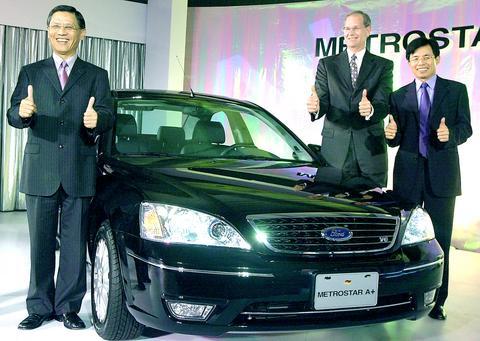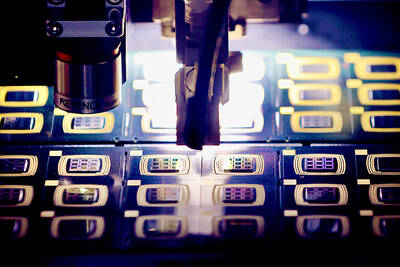New car sales in Taiwan are expected to grow by up to 10 percent next year from this year, thanks to strong consumer spending, industry officials said yesterday.
"We're optimistic about Taiwan's auto market. Car sales are likely to grow steadily by up to 10 percent next year," said Liu Yi-cheng (劉一震), president of Yulon Nissan Co (裕隆日產), a spin-off unit of Yulon Motor Co (裕隆汽車).
The automaker predicted the domestic market would consume a total of 400,000 cars this year, up from around 380,000 units sold last year.

PHOTO: LIAO CHENG-HUEI, TAIPEI TIMES
Liu expected Yulon, the third-largest car manufacturer in Taiwan with a market share of 16.79 percent, to sell about 70,000 units next year, up 7.7 percent from the company's target of 65,000 units for this year.
During the first nine months, Yulon doubled its pre-tax profits to NT$6.84 billion from a year ago, or earnings-per-share of NT$3.7. The automaker reported an increase of 20.7 percent in revenue in the first nine months from a year ago.
Chen Kuo-rong (
Two-thirds of the NT$6.84 billion in earnings came from Yulon's Chinese unit, Fengshen Automotive Co (
Echoing the upbeat projections for next year, Steve Yang (
"We believe 2004 will be a better year, as the economic outlook for next year is brighter. And that plays a crucial role for consumers when they decide to whether or not to buy a car," Yang said, adding that there is even a chance of breaking the record 400,000 units next year.
Hotai, which sells Toyota Motor Corp brand sedans to local consumers, is Taiwan's No. 1 car vendor with about 24.4 percent of market share in terms of car sales in the first 10 months.
The company hopes to sell about 100,000 cars this year, Yang said.
The Hotai official warned that a possible recurrence of the SARS outbreak and the presidential elections in March could weigh on the car market, as uncertainty could hurt car sales.
Looking at the market from a long-term perspective, Yang predicted that car sales would rise to a reasonable level of about 420,000 to 450,000 units within the next five years.
Ford Lio Ho Motor Co (福特六和), Taiwan's No.4 car maker with about 11.9 percent of the local market, also espoused an upbeat view about next year, but disagreed with the idea that the presidential election would pose a threat to local auto sales.
"Fundamentally, it doesn't matter who's going to be the president. Those who can afford a car will still be able to afford," Robert Le Vert Phebus, director of finance at Ford Lio Ho, said yesterday while introducing two revamped Metrostar sedans.
The 2.0-liter model Metrostar is priced between NT$719,000 and NT$819,000, while the 2.5 model is retailed for between NT$860,000 and NT$929,000.
Phebus said his company expected its sales to increase by a single digit next year after posting 5 percent to 10 percent growth both in sales and revenue this year to US$1 billion from last year. Ford is expecting to sell 50,000 units this year.

AI SERVER DEMAND: ‘Overall industry demand continues to outpace supply and we are expanding capacity to meet it,’ the company’s chief executive officer said Hon Hai Precision Industry Co (鴻海精密) yesterday reported that net profit last quarter rose 27 percent from the same quarter last year on the back of demand for cloud services and high-performance computing products. Net profit surged to NT$44.36 billion (US$1.48 billion) from NT$35.04 billion a year earlier. On a quarterly basis, net profit grew 5 percent from NT$42.1 billion. Earnings per share expanded to NT$3.19 from NT$2.53 a year earlier and NT$3.03 in the first quarter. However, a sharp appreciation of the New Taiwan dollar since early May has weighed on the company’s performance, Hon Hai chief financial officer David Huang (黃德才)

The Taiwan Automation Intelligence and Robot Show, which is to be held from Wednesday to Saturday at the Taipei Nangang Exhibition Center, would showcase the latest in artificial intelligence (AI)-driven robotics and automation technologies, the organizer said yesterday. The event would highlight applications in smart manufacturing, as well as information and communications technology, the Taiwan Automation Intelligence and Robotics Association said. More than 1,000 companies are to display innovations in semiconductors, electromechanics, industrial automation and intelligent manufacturing, it said in a news release. Visitors can explore automated guided vehicles, 3D machine vision systems and AI-powered applications at the show, along

FORECAST: The greater computing power needed for emerging AI applications has driven higher demand for advanced semiconductors worldwide, TSMC said The government-supported Industrial Technology Research Institute (ITRI) has raised its forecast for this year’s growth in the output value of Taiwan’s semiconductor industry to above 22 percent on strong global demand for artificial intelligence (AI) applications. In its latest IEK Current Quarterly Model report, the institute said the local semiconductor industry would have output of NT$6.5 trillion (US$216.6 billion) this year, up 22.2 percent from a year earlier, an upward revision from a 19.1 percent increase estimate made in May. The strong showing of the local semiconductor industry largely reflected the stronger-than-expected performance of the integrated circuit (IC) manufacturing segment,

COLLABORATION: Softbank would supply manufacturing gear to the factory, and a joint venture would make AI data center equipment, Young Liu said Hon Hai Precision Industry Co (鴻海精密) would operate a US factory owned by Softbank Group Corp, setting up what is in the running to be the first manufacturing site in the Japanese company’s US$500 billion Stargate venture with OpenAI and Oracle Corp. Softbank is acquiring Hon Hai’s electric-vehicle plant in Ohio, but the Taiwanese company would continue to run the complex after turning it into an artificial intelligence (AI) server production plant, Hon Hai chairman Young Liu (劉揚偉) said yesterday. Softbank would supply manufacturing gear to the factory, and a joint venture between the two companies would make AI data